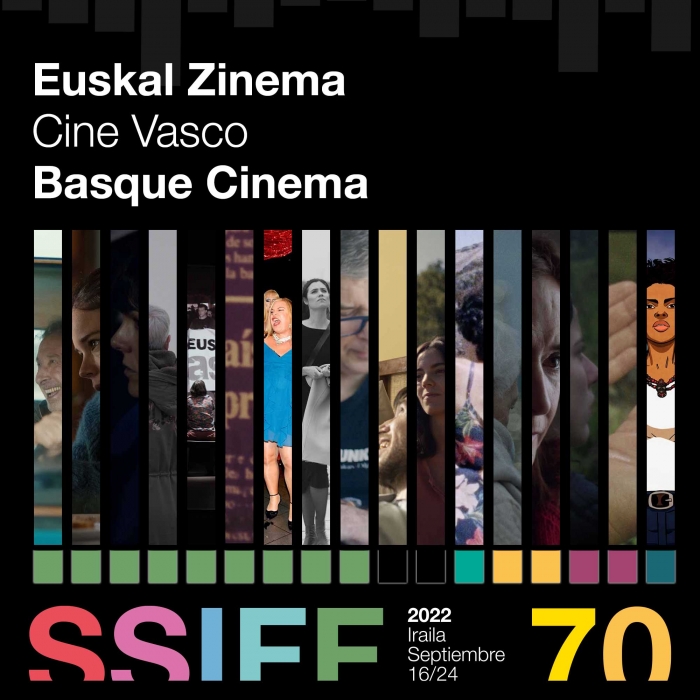The work of the technicians, personalised in the figure of Txema Areizaga, will receive a tribute in the shape of the Zinemira Award.

Seventeen films – thirteen features and four shorts – make up the Basque participation at San Sebastian Festival’s 70th edition, distributed between the Official Selection, New Directors, Zabaltegi-Tabakalera, Nest, Zinemira and the Basque Cinema and EiTB galas.
Zinemira, the section specifically dedicated to Basque cinema, is organised by the San Sebastian Festival and the Basque Government Department of Culture. It is sponsored by Irizar and EiTB, and has the collaboration of the Filmoteca Vasca, the EPE/APV and IBAIA producers associations, and Zineuskadi. At this edition, Zinemira comes with seven fictions and non-fictions. Four of these, being a world premiere at the Festival, will compete for the Irizar Basque Film Award alongside another six works screening in other Festival sections. A total of ten productions will therefore compete for the award of 20,000 euros going to the producer of the film.
The world premiere of the co-production with Argentina El vasco / Dear Grandma will open Zinemira. Jabi Elortegi (Bermeo, 1969), who competed in Zabaltegi-New Directors with his debut movie, Zorion perfektua / Perfect Happiness (2009), directs Joseba Usabiaga, Itziar Aizpuru and Eduardo Blanco in this dramatic comedy.
The producer and screenwriter Izaskun Arandia (Tolosa, 1972) also makes her debut in feature films with My Way Out, a non-fiction reconstructing the story of London’s homonymous transgender nightclub through interviews and archive footage.
Xuban Intxausti (Donostia, 1982) explores in Gesto the background of the pacifist collective Gesto por la paz and its ethical principles, using archive footage and present-day testimonials serving as a framework for reflecting on its three decades of history.
In Karpeta Urdinak / Blue Files, the moviemaker Ander Iriarte (Oiartzun, 1986) launches an investigation based on the suspicion that his father was the victim of torture by police on their premises. His inquiries takes him to the results of the investigation into torture and abuse in the Country between 1960 and 2014 and to the Istanbul Protocol.
The Victoria Eugenia Theatre will provide the setting on Tuesday, September 20, for the Basque Cinema Gala, featuring the premiere of Gelditasuna ekaitzean / Stillness in the Storm, the debut film from Alberto Gastesi (San Sebastian, 1985), a love story starring Loreto Mauleón and Iñigo Gastesi.
A day later, the same setting will host the EiTB Gala with the screening of Kepa Junkera berpiztu / Kepa Junkera Come to Life Again, a feature-length documentary on recovery of the musician from Bilbao, victim of a stroke in 2018, and his legacy, directed by Fermin Aio (Algorta, 1973).
Also competing for the Irizar Basque Film Award are two films already announced in the Official Selection –Suro, by Mikel Gurrea (San Sebastian, 1985), and La consagración de la primavera / The Rite of Spring, by Fernando Franco (Seville, 1976)-, one of them in New Directors –A los libros y a las mujeres canto / To Books and Women I Sing, by Maria Elorza (Vitoria-Gasteiz, 1988)- and Black is Beltza II: Ainhoa, by Fermin Muguruza, which will have its premiere in the Velodrome.
Out of competition
Another three films will complete the Zinemira programme, this time out of competition due to having premiered prior to their screenings in San Sebastian: Cinco lobitos / Lullaby, by Alauda Ruiz de Azúa (Barakaldo, 1978), which will close the section after having been selected for the Berlin, Seattle and Karlovy Vary festivals, having won the major awards at Malaga Festival and having been shortlisted by the Spanish Academy for the Oscars; 918 gau / 918 Nights, by Arantza Santesteban (Pamplona, 1979), which, following the Ikusmira Berriak residency and screening in WIP Europa, bagged awards at Lisbon and Turin; and Bi arnas, by Jon Mikel Fernández Elorz (San Sebastián, 1983) looking at the consequences of torture through the story of Iratxe Sorzabal and her mother.
Also appearing in the Zabaltegi-Tabakalera section are two shorts from the Kimuak programme: Hirugarren koadernoa / The Third Notebook, by Lur Olaizola, to screen following its premiere at Cinéma du Réel, and Cuerdas /Chords by Estibaliz Urresola, after showing at the Semaine de la Critique in Cannes.
For the first time in Nest, the competition for shorts by film school students, two Basque productions in the Basque language will compete for the Nest Award: Erro bi, by Nagore Muriel Letamendia (Villabona, 2000), from the University of the Basque Country; and Noizko basoa / Where Does a Forest Begin, by Mikele Landa Eiguren (Bilbao, 1995), from the Elías Querejeta Zine Eskola.
Although not screening in cinemas, other Basque productions will be included in the Festival, at the project stage, giving an idea of the films they will become. The projects are by Helena Taberna (Nosotros / Us), at the Europe-Latin America Co-Production Forum and Karmele, by Asier Altuna, Una ballena / A Whale, by Pablo Hernando Esquisabel, and Baleazaleak / /Whalemen (At the Ends of the Earth), by Baltasar Kormákur, whIch will participate in the first meeting between international investors and talent agents with local producers in the framework of the Spanish Screenings initiative; and Irati Gorostidi will present her project Anekumen , developed at the Ikusmira Berriak residencies, to film industry representatives.
